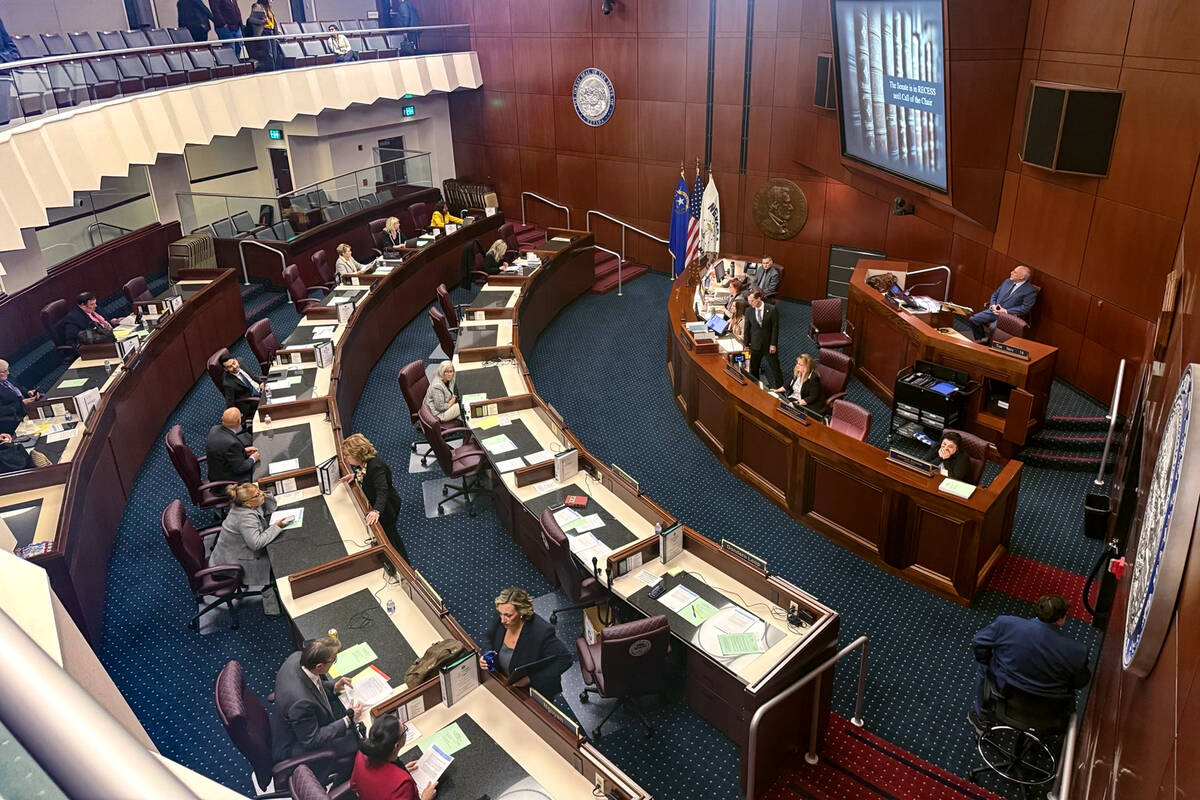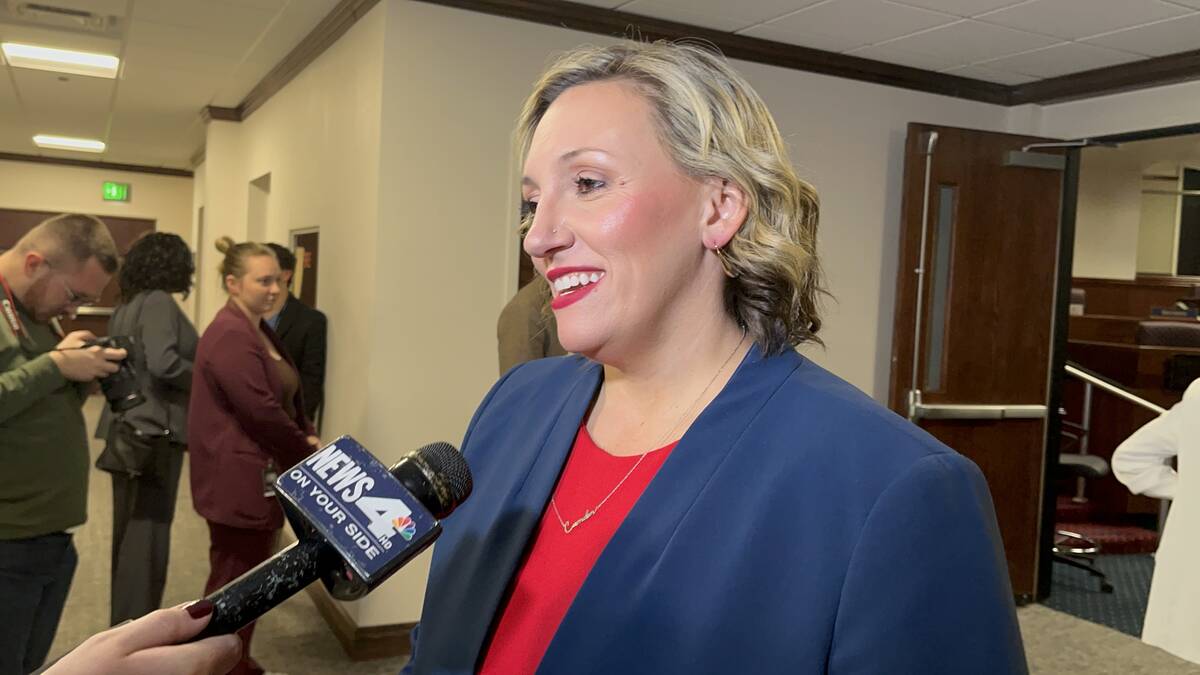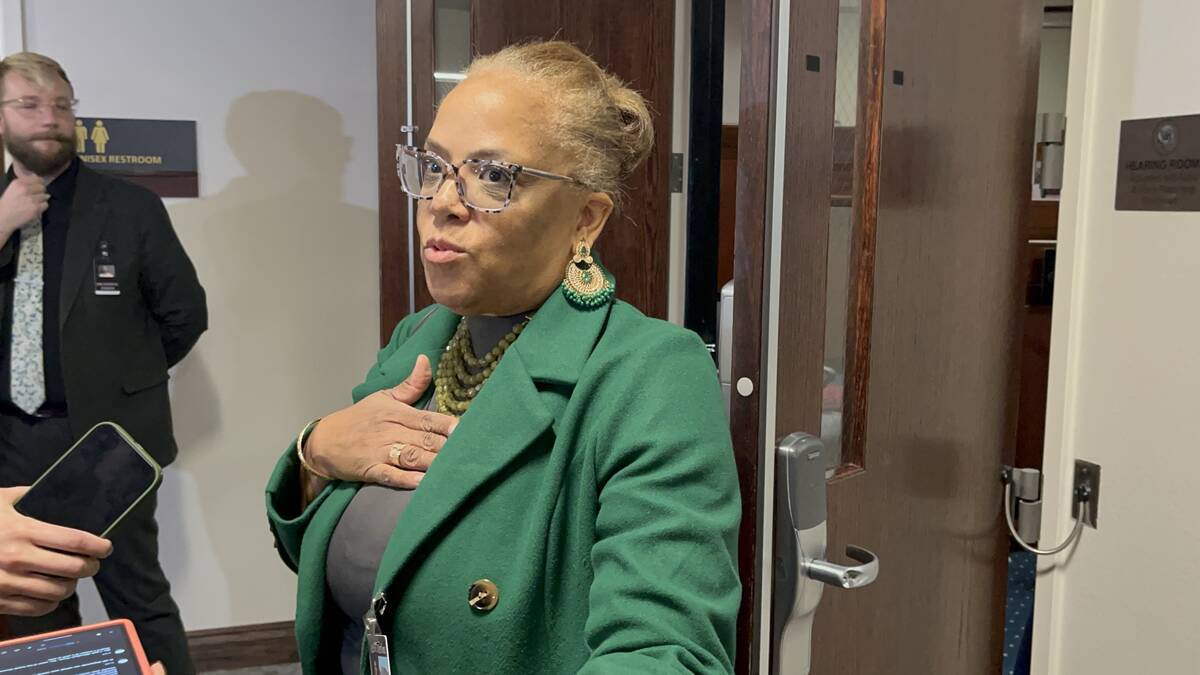5 takeaways from the Nevada Legislature special session
CARSON CITY — Several major pieces of legislation did not make it to the governor’s desk when Nevada legislators ended their week-long special session late Wednesday.
A much-debated film tax credit bill failed in the Senate, and a last-minute bill meant to curb corporate housing purchases died in the Assembly during a flurry of activity in the special session’s waning hours. Democrats were able to push through a resolution asking Nevadans to decide if the state Constitution should include the right to vote by mail.
Gov. Joe Lombardo called the Legislature into special session to address an unexpectedly long list of proposals. One of his main priorities, a sweeping bill that changes dozens of Nevada’s criminal justice laws, was sent to his desk with a notable amendment targeting immigration enforcement in schools.
Thirteen pieces of legislation were sent for the Republican governor’s consideration. Lombardo now has 10 days, excluding Sundays, to decide if he will approve or reject the measures — more time than lawmakers took to introduce and approve the legislation.
As of Thursday evening, five bills have been signed into law, according to the Legislature’s online tracker.
Here are five takeaways from the session:
Where’s the ‘emergency’?
Special sessions are intended to address emergencies, but they have increased in frequency since Nevadans enacted a 120-day session limit in 1998. There have been 36 special sessions called since the first in 1867 — 16 of them since 2001.
Observers had expected at least two bills on the agenda: the governor’s criminal justice bill that died in the 2025 regular session and a proposal to significantly expand the state’s film tax credit program for Hollywood studio development.
When Lombardo called the special session Nov. 12, there were more than a dozen items on the agenda.
Multiple lawmakers questioned the urgency of the session, especially considering the breadth of the agenda. Subjects included school traffic zone safety, public assistance programming in the face of federal government cuts, cybersecurity infrastructure for the state, additional funding to relocate households in a sunken North Las Vegas neighborhood and a grant program to address health care providers shortages, among other provisions.
Assemblymember Selena La Rue Hatch, a vocal opponent of the film tax credit bill, said she questioned why lawmakers were called to Carson City for so many items.
“I said from the start I didn’t think that this was an emergency session,” the Reno Democrat said after the session ended. “I don’t feel like we addressed emergencies. I think Windsor Park was an emergency. I think SNAP was an emergency. But other than that, I felt that everything else should have been handled in regular session.”
Lombardo heralded the “bipartisan work” done that week, saying Nevadans couldn’t afford to wait until the part-time Legislature’s next session in 2027.
“I called this special session because I felt that Nevadans simply could not wait any longer for safer streets, new job opportunities, expanded healthcare access, enhanced small business protections, greater school safety, more assistance for those in need, and essential cybersecurity reforms. Nevadans deserved action now – not years from now – on the issues that most impact their daily lives,” he said in a statement after the final adjournment.
Criminal justice reforms pass, film studio development effort fails
The dramatic push to use tax incentives to lure a film studio campus to Southern Nevada ended in a failed vote in the Senate shortly before lawmakers ended the special session.
A bill proposing to tie $95 million in transferable film tax credits to the development of Summerlin Studios was the subject of strong lobbying efforts and contentious debates during the session and its lead-up.
The back-and-forth focused on whether the state’s contribution of $1.8 billion over a 15-year period would be worth it for the projected tens of thousands of jobs the project could have created.
“If we don’t pass the bill, that land will remain vacant, those jobs won’t come,” Sen. Lisa Krasner, R-Reno, said during debate before the vote. “As Nevadans, we are right to help people that need a hand up, not a hand out.”
The measure failed 10-8 in the Senate, with three senators absent. It needed a majority of the Senate — 11 votes — to pass.
Meanwhile, lawmakers passed the final version of the crime bill in the last hours of the session.
The bill includes enhanced penalties in DUI cases and assaults against hospitality workers, a new felony charge for burglaries involving property damage and expanded definitions of stalking and domestic violence. It could also prompt the return of a controversial court program in Las Vegas that coincided with judges banning criminal defendants from the Strip in increasing numbers.
The bill mandates that judges issue “order-out orders” banning defendants from the Strip for at least a year if they commit more than one crime in the area, but it stops short of requiring the judicial branch bring back the Resort Corridor Court.
Proponents said steps addressing crime on the Strip are necessary to reduce repeat offenders in the area. Sen. Fabian Donate, D-Las Vegas, who represents the district encompassing the Strip, told the Review-Journal he was in favor of the bill from a “workers’ safety perspective.”
Opponents and civil liberties groups raised concerns that the resort corridor measures target homeless people.
Some Democrats opposed the crime bill early in the special session, saying there were no provisions addressing immigration enforcement. Lawmakers later added an amendment that would prevent schools from cooperating with immigration officials and requires detention facilities to maintain publicly available lists of people held in the facility.
“I think it’s an important policy to ensure that kids are safe in school and their families are safe when they come to drop their kids off and pick them up,” said Sen. Melanie Scheible, D-Las Vegas.
Lombardo vetoed a bill with similar restrictions in the regular session and has not said whether he will sign or veto the crime bill with the immigration enforcement limits added to it.
Unprecedented move to regulate corporate home purchases
Lawmakers took extraordinary action on Tuesday and Wednesday, when a bipartisan group of Legislators changed the governor’s special session agenda to include a bill of their own.
Special sessions have historically been called only by governors. But the Nevada Constitution allows the Legislature to call their own session – or in this case, add their own agenda item – if a two-thirds majority in each house signs a petition for one.
Democrats were just shy of that supermajority, but on Tuesday, Sen. Ira Hansen, R-Sparks, and Assemblymember Alexis Hansen, R-Sparks, joined their colleagues across the aisle in signing a petition to put a bill regulating corporate home ownership in the state. The bill was introduced Wednesday and quickly moved through the Legislature that same day – before falling one vote short of the two-thirds majority in the Assembly it needed to pass. Alexis Hansen was the deciding ‘no’ vote.
“I never committed my vote,” she said during floor debate. “I was hoping for the best, and that has not transpired.”
The bill was based on previous legislation sponsored by Sen. Dina Neal, D-North Las Vegas. A 2023 bill with similar language – preventing corporations from buying more than a combined 1,000 housing units in a year – was vetoed by the governor in 2023. Another version setting the limit at 100 was introduced during the 2025 regular session but failed to move out of the Senate.
After the final gavel drop, Neal told reporters she was still proud that the bill generated such a robust discussion.
“We did a historical petition to amend the governor’s proclamation, and we had a substantial hearing where (the) community came out and expressed how this is a consistent issue,” Neal said. “And so in regards to being on the right side of history, I think I’ve been on the right side of history now for three sessions – two regulars and one special. So to me, I’m winning because I keep lifting this issue, because it is a problem.”
Eleventh-hour resolution address mail-in ballots
Within the last hour of the special session, Senate Democrats brought forth a resolution that could result in a ballot question in 2028 on mail-in voting.
The resolution was approved by the Senate and Assembly on Wednesday night. It will need to be reconsidered in the 2027 regular session before it could be placed on the ballot in the 2028 general election.
According to draft language, the resolution proposes amending the Nevada Constitution to require county clerks to send a mail ballot to each active, eligible registered voter. It also proposes that clerks should establish locations for voters to drop off their mail ballots in the three days leading up to an election.
The resolution details when the mail ballot should be sent and would allow a voter to elect not to receive a mail ballot.
Senate Majority Leader Nicole Cannizzaro, D-Las Vegas, said the resolution is meant to expand Nevadans ability to vote.
“It is time that we enshrine that right as part of our voting rights in the Nevada Constitution and ensure that there are plenty of places for people to bring that mail in-ballot, and make sure that their vote is counted,” she said after the special session ended.
Transparency fight
Civil liberties advocates raised transparency concerns early in the special session when the Assembly did not allow call-in testimony, meaning the public could only comment on bills in person in Carson City or Las Vegas legislative buildings.
Many of the normal rules for a legislative session are suspended during special session, which lawmakers say is necessary to expedite their work. That means timelines shorten for when bills pass through the Legislature.
Some lobbyists and advocates who testified in committee meetings throughout the week commented that they opposed legislation because they did not have enough time to fully consider the impact of bills.
Although the Assembly limited some testimony, senators listened to hours of calls from the public debating the controversial film tax credit bill.
“I think that we had more community and people moving and calling through this building than we’ve ever had in a special (session),” said Sen. Dina Neal, D-North Las Vegas. “I think that’s power, and I think that’s actually success.”
Contact McKenna Ross at mross@reviewjournal.com. Follow @mckenna_ross_ on X. Contact Katelyn Newberg at knewberg@reviewjournal.com or 702-383-0240.




















